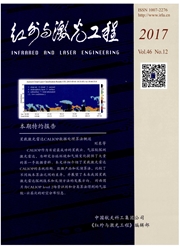

 中文摘要:
中文摘要:
采用60 Co-γ射线对像增强型图像传感器进行了总剂量辐照实验,以便评估该器件在空间总剂量辐照下的微光探测性能。当总剂量达到预定剂量点时,采用离线测试的方法定量测试了器件的光响应度变化情况。实验结果表明,随着辐照总剂量的增加,器件的光响应度迅速下降;当总剂量达60krad(Si)时,相对光响应度降低至辐照前的6%。根据像增强型图像传感器的构成,分析了光响应度下降的原因,并推导了光响应度随辐照剂量变化的经验公式。实验显示,提高像增强型图像传感器的增益电压可补偿光响应度的衰减,总剂量达25krad(Si)时,增益提高0.23V其光响应度即可恢复至未接受辐照前的100%,并保持良好的微光探测能力。研究表明,像增强型图像传感器可承受25krad(Si)的总剂量辐射。
 英文摘要:
英文摘要:
An irradiation experiment for an image-intensified sensor(Intensified Complemetary Metaloxide Semiconductor,ICMOS)was performed with a 60Co-γray source to evaluate its weak-light-detecting ability under the total dose irradiation.When the total dose of irradiation reached the predetermined point,the change of photoelectric response capability of the sensor was measured quantitatively by an off line method.The experiment results show that as the total dose of irradiation increases,the photoelectric response capability decreases rapidly.When the total dose of irradiation reaches 60krad(Si),the photoelectric response capability is reduced to 6%.The causes of decline of the photoelectric response capability were analyzed according to the components of the image-intensified sensor and empirical equations of the decline of the photoelectric response capability were also derived.The experiments demonstrate that the decline of the photoelectric response capability is compensated by improving the voltage gain of the image-intensified sensor.When the total dose of irradiation reaches 25krad(Si),the photoelectric response capability still maintains 100%by improving the voltage gain of the image-intensified sensor of 0.23 V meanwhile maintaining agood weak-light-detecting ability.These findings showthat the image-intensified sensor is able to withstand 25krad(Si)of the total dose irradiation.
 同期刊论文项目
同期刊论文项目
 同项目期刊论文
同项目期刊论文
 期刊信息
期刊信息
